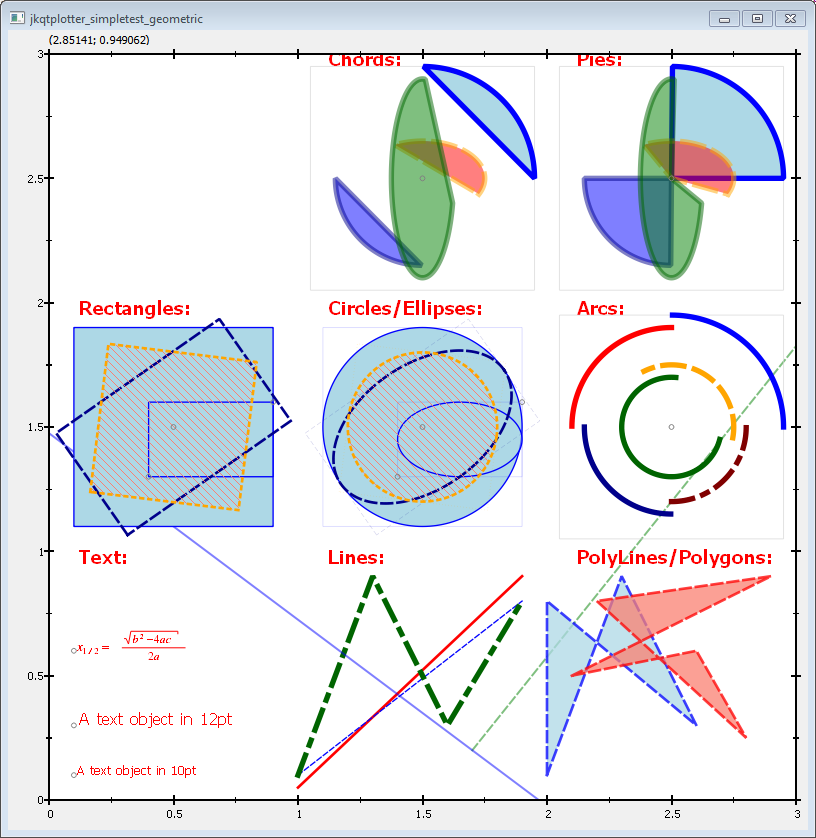mirror of
https://github.com/jkriege2/JKQtPlotter.git
synced 2025-02-24 17:31:47 +08:00
- fixed JKQTPColumnMathImage with modifiers - improved documentation - make use of link_prl/create_prl in QMake projects (see http://doc.qt.io/qt-5/qmake-advanced-usage.html) |
||
|---|---|---|
| .. | ||
| jkqtplotter_simpletest_geometric_and_lib.pro | ||
| jkqtplotter_simpletest_geometric.cpp | ||
| jkqtplotter_simpletest_geometric.pro | ||
| README.md | ||
Example (JKQTPlotter): Plotting Geometric Objects
This project (see ./test/simpletest_geometric/) shows the capabilities of JKQTPlotter to also draw geometric elements, like circles, ellipses, rectangles etc.
The source code of the main application can be found in jkqtplotter_simpletest_geometric.cpp. First a plot is generated and the axis aspect ration is set to 1, so an accurate plot is generated. Then several geometric graphs are added to the plot. Here are some examples, you can find more more examples in the source code of the example:
// a text element
plot.addGraph(new JKQTPGeoText(&plot, 0.1,0.6, "$x_{1/2}=\\frac{\\sqrt{b^2-4ac}}{2a}$", 10, QColor("red")));
// a single symbol
plot.addGraph(new JKQTPGeoSymbol(&plot, 0.1,0.6, JKQTPCircle, 5, QColor("grey")));
// a line
plot.addGraph(new JKQTPGeoLine(&plot, 1, 0.05, 1.9, 0.9, QColor("red"), 2));
// a one-sided infinite line with slope dy/dx=0.25/0.2
JKQTPGeoInfiniteLine* infLine=new JKQTPGeoInfiniteLine(&plot, 1.7, 0.2, 0.2, 0.25, QColor("green"), 1.5, Qt::PenStyle::DashLine);
infLine->setTwoSided(false);
infLine->setAlpha(0.5);
plot.addGraph(infLine);
// a polyline
QVector<QPointF> p;
p<<QPointF(1, 0.1)<<QPointF(1.3, 0.9)<<QPointF(1.6, 0.3)<<QPointF(1.9, 0.8);
plot.addGraph(new JKQTPGeoPolyLines(&plot, p, QColor("darkgreen"), 4, Qt::PenStyle::DashDotLine));
// rectangle:
plot.addGraph(new JKQTPGeoRectangle(&plot, QPointF(0.4,1.3), QPointF(0.9,1.6), QColor("blue"), 1, Qt::SolidLine, rfill));
// a rotated rectangle (rotated by 35 degrees):
plot.addGraph(new JKQTPGeoRectangle(&plot, 0.5,1.5,0.8,0.5, 35, QColor("darkblue"), 2, Qt::DashLine));
// ellipse:
plot.addGraph(new JKQTPGeoEllipse(&plot, QPointF(0.4,1.3), QPointF(0.9,1.6), QColor("blue"), 1, Qt::SolidLine, rfill));
// a rotated ellipse (rotated by 35 degrees):
plot.addGraph(new JKQTPGeoEllipse(&plot, 0.5,1.5,0.8,0.5, 35, QColor("darkblue"), 2, Qt::DashLine));
// a polygon
JKQTPGeoPolygon* polygraph=new JKQTPGeoPolygon(&plot, QColor("red"), 2, Qt::PenStyle::DashLine, QColor("salmon"));
polygraph->appendPoint(2.1, 0.5);
polygraph->appendPoint(2.9, 0.9);
polygraph->appendPoint(2.2, 0.8);
polygraph->appendPoint(2.8, 0.25);
polygraph->appendPoint(2.6, 0.6);
polygraph->setAlpha(0.75);
plot.addGraph(polygraph);
// an arc from an ellipse from -10 degrees to 117 degrees, centered at 2.5,1.5 and full axes of 0.5 and 0.5
plot.addGraph(new JKQTPGeoArc(&plot,2.5,1.5,0.5,0.5, -10, 117 , QColor("orange"), 4, Qt::PenStyle::DashLine));
// a pie centered at 2.5,2.5 with ellipse axes 0.9 and 0.9 and from angle 0 degrees to 90 degrees
plot.addGraph(new JKQTPGeoPie(&plot,2.5,2.5,0.9,0.9, 0, 90 , QColor("blue"), 4, Qt::PenStyle::SolidLine,QColor("lightblue")));
// a chord centered at 2.5,2.5 with ellipse axes 0.9 and 0.9 and from angle 0 degrees to 90 degrees
plot.addGraph(new JKQTPGeoChord(&plot,2.5,2.5,0.9,0.9, 0, 90 , QColor("blue"), 4, Qt::PenStyle::SolidLine,QColor("lightblue")));
The result of the example combines all these elements and looks like this:
